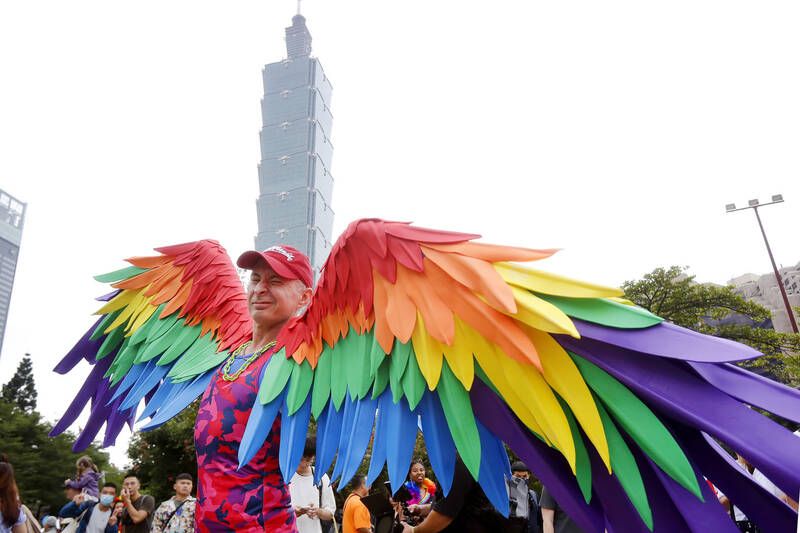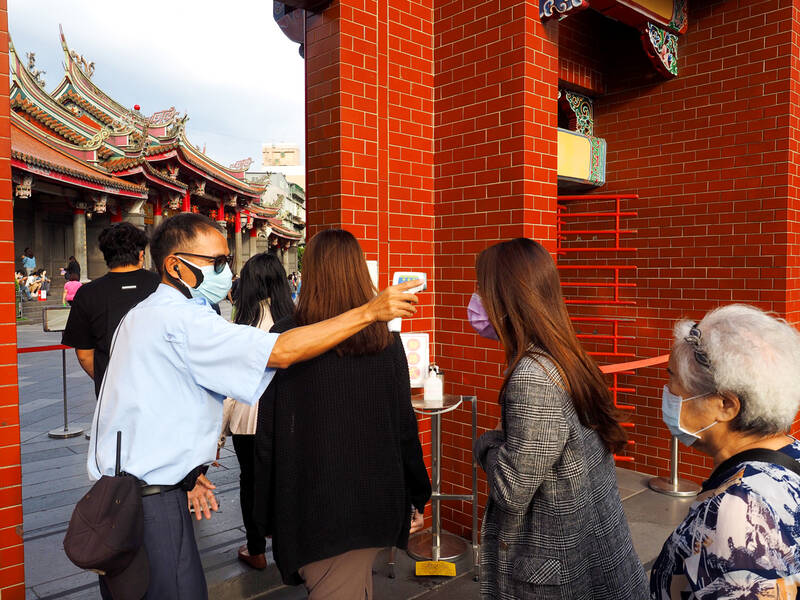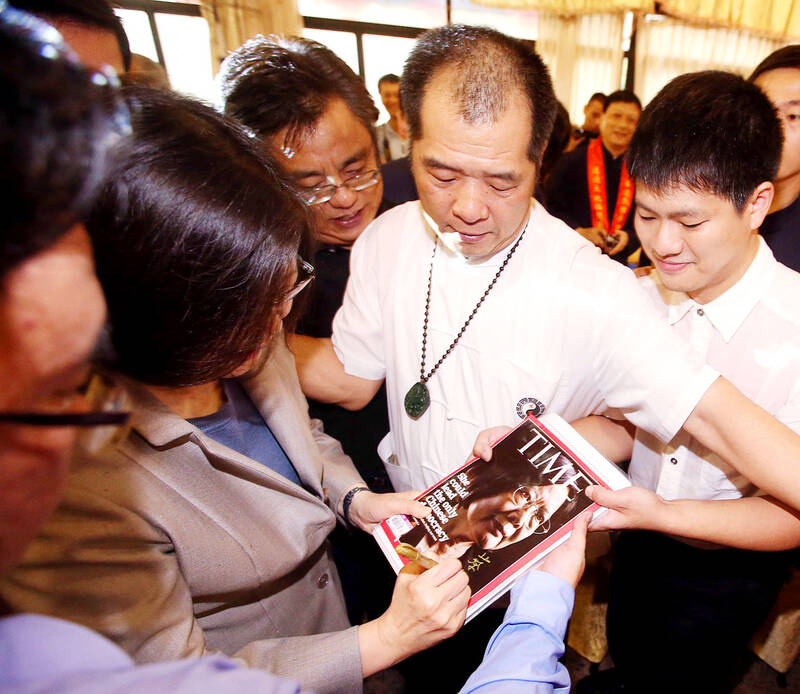How will the presidency of Tsai Ing-wen (蔡英文) era be remembered? Over time memories will fade on the endless back and forth of hyperventilating partisan politics over issues of the day, but what will stand out?
In yesterday’s column, we examined the sea change in cross-strait relations that took place following the Ma Ying-jeou (馬英九) era, with caution replacing Ma’s enthusiastic embracing of the People’s Republic of China (PRC) and the “one China principle” embedded in the so-called “1992 consensus” as Tsai embodied the post-Sunflower movement consensus. Relations cooled, the Chinese Communist Party (CCP) took to lashing out diplomatically, militarily through gray zone incursions, economically by barring some Taiwanese imports and withdrawing approval for the mass waves of Chinese tour groups that were so prominent during the later Ma era.
Conscription was restored to one year from four months, the local defense industry bolstered and military spending increased, but only to 2.5 percent of GDP, a far cry from the 3 percent originally Tsai campaigned on. No doubt the CCP’s increased aggression and changing the status quo as well as Tsai’s standing firm against them — as she was elected to do — will form a big part of her legacy.

Photo: AP
In most respects, the Tsai era has been stable, economic growth respectable and Taiwan’s role on the world stage vastly expanded. Unlike the seemingly endless protests on many issues during the second Ma term, few will remember the protests against her administration, including those against pension reforms, the anti-marriage equality rallies or the biggest of them all, the pro-marriage equality rallies.
There were scandals, such as the egg procurement disaster that at best could be categorized as grossly incompetent and other issues that raised legitimate questions such as the opacity of vaccine procurement during the pandemic and the high correlation between some figures in the Democratic Progressive Party’s (DPP) New Tide faction, political donations and green energy procurement. These will likely be simply footnotes in history as nothing more than some dubious practices were ever proven, unlike the shocking revelations of corruption and sleaze and Red Shirt protests during the era of Chen Shui-bian (陳水扁). Compared to the Chen and Ma eras, during the Tsai presidency there was relatively little protest, no assassination attempts, fears of being sold out to China or a coup taking place and tea eggs could once again be purchased at Sun Moon Lake without wading through a sea of Chinese tourists.
The polls appear to show that the public has approved of this stability. The polls averaged about 50 percent approval just prior to her leaving office, far above the dismal 20.5 percent that Chen left office with and similarly low 28.9 percent. Few leaders worldwide after eight years in office leave with approval ratings as high as Tsai’s.

Photo: EPA-EFE
It is important to note that history will almost certainly give her credit for things she does not entirely deserve credit for, and in other cases will overlook things she accomplished.
FOREIGN POLICY
By almost all measures, except two, the Tsai foreign policy team led by herself and backed by Minister of Foreign Affairs Joseph Wu (吳釗燮) and de-facto ambassador to the US Hsiao Bi-khim (蕭美琴), the current vice president, was highly successful and the Tsai administration will be given high marks for it. One of the two measures is the worsening relations with China, but this is entirely due to the CCP’s attitude and not Tsai, whose policies towards China were precisely what she was elected to carry out.

Photo: CNA
The other is the loss of formal diplomatic recognition by 10 countries, leaving only a dozen countries and the Vatican remaining. The CCP’s money talked, and many walked.
More importantly, Taiwan’s relations have deepened significantly with — as the US government likes to put it — “like-minded partners.” When Tsai took office in 2016, most countries went out of their way to avoid even mentioning Taiwan for fear of “upsetting” China and losing access to imagined riches they might get from their market.
Today things are very different. Delegations from countries around the world arrive seemingly every other day, and hardly a week passes without some legislative body somewhere passing a bill in support of Taiwan, calling for Taiwan to be able to join various international fora or “peace and stability in the Taiwan Strait.”
The Americans have sent military training personnel and have passed multiple bills in support of Taiwan, including for military aid. They are openly coordinating with the Japanese and Australians, and are deepening involvement in the region, including with the Philippines in locations near to Taiwan.
President Tsai is a remarkably talented diplomat, and watching her speeches to foreign dignitaries and think tanks it is clear she is capable of carefully crafting her language on multiple levels to achieve multiple goals. Joseph Wu masterfully used the press to Taiwan’s benefit, while Hsiao was the toast of Washington DC.
However, this team in many ways skillfully navigated events and trends happening around them, rather than creating them. Much of the world has woken up to just how manipulative, cunning and evil the CCP is.
The pandemic also woke the world up to the critical role supply chains play and Taiwan’s, and especially Taiwan Semiconductor Manufacturing Co’s (TSMC, 台積電), role within them. The world now realizes it needs Taiwan and that war in the Taiwan Strait would devastate the world economically.
The Tsai administration also cleverly took advantage of the speedy and nimble response by Taiwanese companies, who beat the world in rapidly producing face masks and other medically necessary kit during the pandemic, and donated large volumes to the rest of the world when they desperately needed it under the banner “Taiwan can help,” albeit often confusingly standing in front of a China Airlines plane. This campaign garnered considerable goodwill for Taiwan. China, by contrast, was criticized for selling their kit, often with subpar quality.
MARRIAGE EQUALITY
The Tsai administration will be credited with this, though it will be almost entirely undeserved, as the Council of Grand Justices — since renamed to Constitutional Court — mandated it to happen. The DPP had no choice but to pass it, and even then it was not fully equal in terms of adoption and the right to marry foreigners from countries that did not recognize marriage equality.
The reality is that after rather cynically using pride imagery in the 2016 election, the DPP had no intention of doing anything on the issue. Tsai herself washed her hands of it more than once, saying it was up to the legislature to deal with, later stating that there was no consensus in society, implying that until there was, it was a dead issue.
ECONOMIC ISSUES
In a macro sense, the economy did well during the Tsai era. The TAIEX benchmark weighted index on the Taiwan Stock Exchange surged more than 160 percent, the economy grew by an average of 3.15 percent per year and beat out the other three “little dragon” economies, unemployment dropped to the lowest in 24 years in April and GDP per capita surpassed South Korea in 2022 and is projected to pass Japan or already has.
Though not popular with civil servants, Tsai moved boldly on pension reform and saved the system from financial collapse.
Wages did rise during Tsai’s years in office, but recently only roughly on par with inflation. Unlike her predecessors, her administration raised the monthly minimum wage every year and over eight years raised it from NT$20,008 to NT$27,470, but this still falls short of her campaign promise of NT$30,000.
The bad news is the housing affordability crisis continued to escalate, making Taiwan’s cities some of the most expensive in the world. Compared to median salary, the Taipei metro area is more expensive than London or New York and in a chart compiled by Roy Ngerng (鄞義林) for The News Lens using recent data showed Taipei as the second most expensive in the world, and Taiwan’s mortgage burden relative to income the highest in the world.
THE PANDEMIC
Taiwan, like almost every country, made a lot of mistakes during the pandemic. However, it suffered one of the lowest death rates in the world and the Tsai administration made headlines around the world, which will no doubt be mentioned in the history books.
Of course, that Taiwan is comprised of islands helped significantly. Still, at one point Taiwan was able to go 200 days with no new local cases, and myself along with Douglas Habecker were able to host the Compass Food and Music Festival, which due to worldwide lockdowns was for that year the biggest festival on the planet.
TRANSITIONAL JUSTICE
The Tsai administration moved quickly and decisively on passing the ill-gotten gains act that stripped the KMT of assets they had seized during the authoritarian era. The KMT had long promised they would get around to this, but never did. In theory, this leveled the financial playing field, but in practice it hit the KMT hard because when they were rich they had vastly overstaffed as rewards for loyalty, and were stuck with massive liabilities in severance and pensions.
Victims of the White Terror were exonerated and information shared with family members, and records collected for posterity. Some victims also got financial restitution.
But that is about all. Some statues came down, but many still stand.
Unlike other countries, transitional justice came with neither a reconciliation process, or any retributive justice. No sorries. No jail time.
MEMORABLE IMAGES
To those of us who lived through the era, there are some images and pictures that will be remembered about Tsai herself.
Her love and use of pictures and memes of herself with her pets will no doubt linger in the mind. Another is the photo of Tsai, with a placid and vaguely pleasantly nerdy demeanor calmly avoiding drama, looking out in the distance on the cover of Time magazine. More boldly is that famous image of her striding confidently down a corridor with the vice president and her officials trailing her looking calmly resolved and exuding power.
The memorable meme of Tsai standing in front of a tank like the “tank man” at Tiananmen Square might come to mind. Or perhaps the famous photo of her dressed in camouflage and brandishing a bazooka.
Donovan’s Deep Dives is a regular column by Courtney Donovan Smith (石東文) who writes in-depth analysis on everything about Taiwan’s political scene and geopolitics. Donovan is also the central Taiwan correspondent at ICRT FM100 Radio News, co-publisher of Compass Magazine, co-founder Taiwan Report (report.tw) and former chair of the Taichung American Chamber of Commerce. Follow him on X: @donovan_smith.

US President Donald Trump may have hoped for an impromptu talk with his old friend Kim Jong-un during a recent trip to Asia, but analysts say the increasingly emboldened North Korean despot had few good reasons to join the photo-op. Trump sent repeated overtures to Kim during his barnstorming tour of Asia, saying he was “100 percent” open to a meeting and even bucking decades of US policy by conceding that North Korea was “sort of a nuclear power.” But Pyongyang kept mum on the invitation, instead firing off missiles and sending its foreign minister to Russia and Belarus, with whom it

When Taiwan was battered by storms this summer, the only crumb of comfort I could take was knowing that some advice I’d drafted several weeks earlier had been correct. Regarding the Southern Cross-Island Highway (南橫公路), a spectacular high-elevation route connecting Taiwan’s southwest with the country’s southeast, I’d written: “The precarious existence of this road cannot be overstated; those hoping to drive or ride all the way across should have a backup plan.” As this article was going to press, the middle section of the highway, between Meishankou (梅山口) in Kaohsiung and Siangyang (向陽) in Taitung County, was still closed to outsiders

President William Lai (賴清德) has championed Taiwan as an “AI Island” — an artificial intelligence (AI) hub powering the global tech economy. But without major shifts in talent, funding and strategic direction, this vision risks becoming a static fortress: indispensable, yet immobile and vulnerable. It’s time to reframe Taiwan’s ambition. Time to move from a resource-rich AI island to an AI Armada. Why change metaphors? Because choosing the right metaphor shapes both understanding and strategy. The “AI Island” frames our national ambition as a static fortress that, while valuable, is still vulnerable and reactive. Shifting our metaphor to an “AI Armada”

The Chinese Communist Party (CCP) has a dystopian, radical and dangerous conception of itself. Few are aware of this very fundamental difference between how they view power and how the rest of the world does. Even those of us who have lived in China sometimes fall back into the trap of viewing it through the lens of the power relationships common throughout the rest of the world, instead of understanding the CCP as it conceives of itself. Broadly speaking, the concepts of the people, race, culture, civilization, nation, government and religion are separate, though often overlapping and intertwined. A government